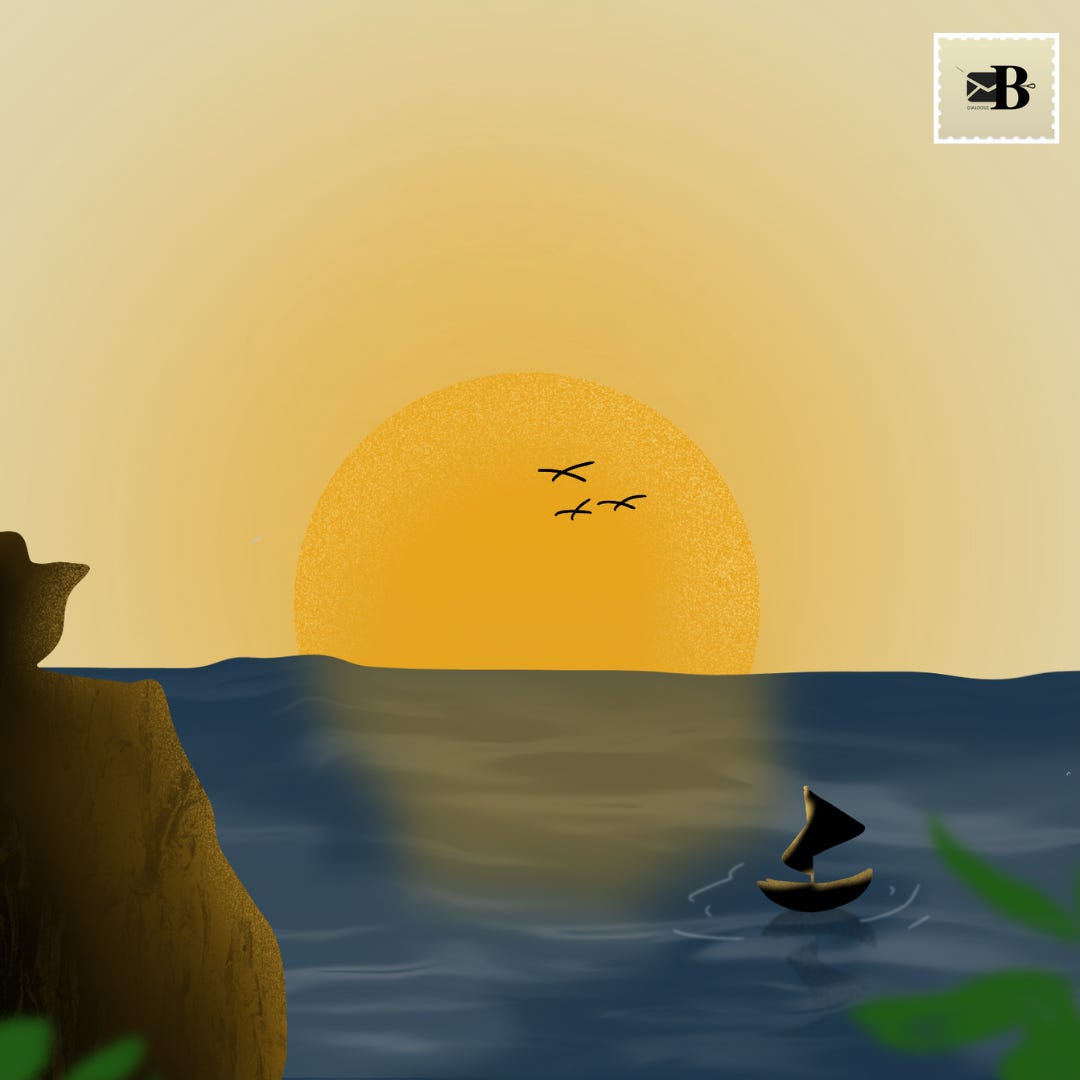Miscellany #11 Dawn, Poems by Philip Larkin and Ruskin Bond
Dawn was breaking over the horizon, shell pink and faintly gold - J.K. Rowling
From the Editor
Last year, I grew weary of remote work, so I sought an escape from the city and organized a trip to the hills. Upon arriving in Mussoorie, I encountered heavy rain. Aware of the difficulty of venturing outside, I set out to find accommodation with a picturesque balcony offering splendid hill views. After much searching, luck favored me, and I discovered a place with an enchanting balcony. It was on one of those early mornings, in the serenity of that balcony, that I penned the poem "Morning Dew."
Morning Dew
In the stillness of 6 am, my coffee brews so strong, As rain pours heavily on the hills, where it belongs.
Preparing for the day anew, my eyes brim with delight, Excitement stirs within to witness morning's dew so bright.
I pull a cigarette from my teeth, settling on the cold balcony, The cup of coffee and raindrops grace my face so gently.
I take a deep breath, effortless as can be, Inhaling and exhaling, a rhythm flowing free.
As far as my eyes can reach, the Mussorie hills in sight, Forever dancing in the morning dew's ethereal light.
Aubade by Philip Larkin
Source: https://www.poetryfoundation.org/poems/48422/aubade-56d229a6e2f07
In this poem by Philip Larkin titled "Aubade," the speaker reflects on the fear of death that haunts their mind during the early morning hours. The poem explores the inevitability of death, the emptiness it brings, and the futile attempts to escape its grasp. The speaker contemplates the limitations of religion and the ultimate powerlessness in the face of mortality. As the morning progresses, the world awakens to its daily routines while the specter of death lingers in the background, reminding us of our mortality.
I work all day, and get half-drunk at night.
Waking at four to soundless dark, I stare.
In time the curtain-edges will grow light.
Till then I see what’s really always there:
Unresting death, a whole day nearer now,
Making all thought impossible but how
And where and when I shall myself die.
Arid interrogation: yet the dread
Of dying, and being dead,
Flashes afresh to hold and horrify.
The mind blanks at the glare. Not in remorse
—The good not done, the love not given, time
Torn off unused—nor wretchedly because
An only life can take so long to climb
Clear of its wrong beginnings, and may never;
But at the total emptiness for ever,
The sure extinction that we travel to
And shall be lost in always. Not to be here,
Not to be anywhere,
And soon; nothing more terrible, nothing more true.
This is a special way of being afraid
No trick dispels. Religion used to try,
That vast moth-eaten musical brocade
Created to pretend we never die,
And specious stuff that says No rational being
Can fear a thing it will not feel, not seeing
That this is what we fear—no sight, no sound,
No touch or taste or smell, nothing to think with,
Nothing to love or link with,
The anaesthetic from which none come round.
And so it stays just on the edge of vision,
A small unfocused blur, a standing chill
That slows each impulse down to indecision.
Most things may never happen: this one will,
And realisation of it rages out
In furnace-fear when we are caught without
People or drink. Courage is no good:
It means not scaring others. Being brave
Lets no one off the grave.
Death is no different whined at than withstood.
Slowly light strengthens, and the room takes shape.
It stands plain as a wardrobe, what we know,
Have always known, know that we can’t escape,
Yet can’t accept. One side will have to go.
Meanwhile telephones crouch, getting ready to ring
In locked-up offices, and all the uncaring
Intricate rented world begins to rouse.
The sky is white as clay, with no sun.
Work has to be done.
Postmen like doctors go from house to house.
Lone Fox Dancing by Ruskin Bond
In "Lone Fox Dancing" by Ruskin Bond, the poet describes encountering a solitary fox dancing under the cold moonlight on his way home. The poet observes the fox with fascination and acknowledges its ownership of the night. Inspired by the authenticity of such moments, the poet compares himself to a lone fox dancing in the morning dew, finding his own truth in nature's beauty
As I walked home last night
I saw a lone fox dancing
In the cold moonlight.
I stood and watched. Then
Took the low road, knowing
The night was his by right.
Sometimes, when words ring true,
I'm like a lone fox dancing
In the morning dew


